变化中的会计师审计独立性——与当前环境与时俱进 外文原文
注册会计师审计独立性问题研究【文献综述】
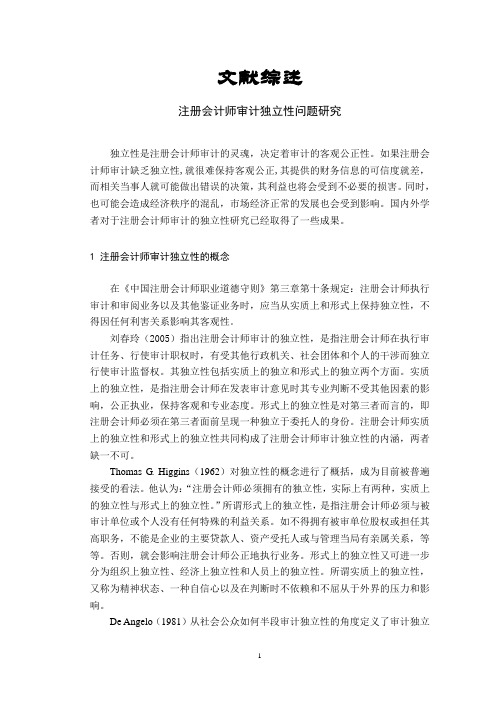
文献综述注册会计师审计独立性问题研究独立性是注册会计师审计的灵魂,决定着审计的客观公正性。
如果注册会计师审计缺乏独立性,就很难保持客观公正,其提供的财务信息的可信度就差,而相关当事人就可能做出错误的决策,其利益也将会受到不必要的损害。
同时,也可能会造成经济秩序的混乱,市场经济正常的发展也会受到影响。
国内外学者对于注册会计师审计的独立性研究已经取得了一些成果。
1 注册会计师审计独立性的概念在《中国注册会计师职业道德守则》第三章第十条规定:注册会计师执行审计和审阅业务以及其他鉴证业务时,应当从实质上和形式上保持独立性,不得因任何利害关系影响其客观性。
刘春玲(2005)指出注册会计师审计的独立性,是指注册会计师在执行审计任务、行使审计职权时,有受其他行政机关、社会团体和个人的干涉而独立行使审计监督权。
其独立性包括实质上的独立和形式上的独立两个方面。
实质上的独立性,是指注册会计师在发表审计意见时其专业判断不受其他因素的影响,公正执业,保持客观和专业态度。
形式上的独立性是对第三者而言的,即注册会计师必须在第三者面前呈现一种独立于委托人的身份。
注册会计师实质上的独立性和形式上的独立性共同构成了注册会计师审计独立性的内涵,两者缺一不可。
Thomas G. Higgins(1962)对独立性的概念进行了概括,成为目前被普遍接受的看法。
他认为:“注册会计师必须拥有的独立性,实际上有两种,实质上的独立性与形式上的独立性。
”所谓形式上的独立性,是指注册会计师必须与被审计单位或个人没有任何特殊的利益关系。
如不得拥有被审单位股权或担任其高职务,不能是企业的主要贷款人、资产受托人或与管理当局有亲属关系,等等。
否则,就会影响注册会计师公正地执行业务。
形式上的独立性又可进一步分为组织上独立性、经济上独立性和人员上的独立性。
所谓实质上的独立性,又称为精神状态、一种自信心以及在判断时不依赖和不屈从于外界的压力和影响。
De Angelo(1981)从社会公众如何半段审计独立性的角度定义了审计独立性,认为审计独立性是审计师在发展审计客户财务报告无比后予以报告的概率,审计独立性反映了审计人员地址客户选择性披露压力的能力。
事务所的任期、会计师轮换与审计独立性——来自中国A股市场的证据

第 6 ( 第 14期 ) 期 总 3 20 0 7年 1 月 1
财
经
论
丛
N .6 ( eea,N . 14 o G nr l o 3)
No . 2 o v O 7
Colc e Esa R Fi nc n on m is le td s yso na e a d Ec o c
10044892200706007807近年来世界范围内连续发生了一系列上市公司进行会计欺诈作为公司审计师的会计师事务所出具不实审计报告的事件严重损害了投资者的利益动摇了公众对证券市场的信心并引发了注册会计师职业出现严重的诚信危机问题限制审计任期的呼声也越来越高
维普资讯
・
英 (91) 17 . ,女 ,四 川绵 阳人 ,上 海 财 经 大 学会 计 学 院 讲 师 , 博 士生 。
7 ・ 8
维普资讯
杜
英 事务 所 的任期 、会 计 师轮换 与审计独 立性
间的关 系 。其结 果显示 ,财务报 告 的舞弊 更可 能发生 在审计 任期 的前三年 ,而 长 的审计 任期并 没有 提高财务 报表舞 弊 的可 ห้องสมุดไป่ตู้性 。Jh sn K u n ono , h m a和 R yo s(0 2 enl 2 0 )以及 Myr yr d e,M e s和 O e 2 0 ) m r(0 3
师的聘期 。
限制 审计任期 的问题其 实质 就是审计 任期 与审计独 立性 的关系 问题 。那 么审计 任期与审计 独立
性 的关系究 竟是怎样 的?会 计师事 务所 的审计任期 与 审计负 责人 的任期对 审计独立 性的影响 有差异 吗?这就 是本文希 望 回答 的问题 。
一
、
注册会计师审计独立性问题的研究
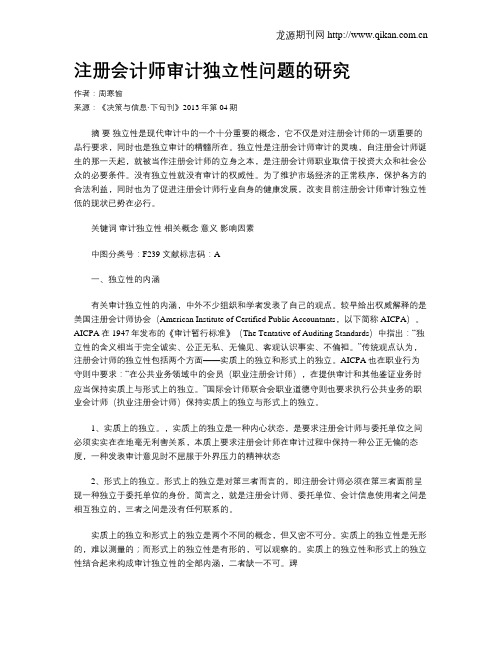
注册会计师审计独立性问题的研究作者:周寒愉来源:《决策与信息·下旬刊》2013年第04期摘要独立性是现代审计中的一个十分重要的概念,它不仅是对注册会计师的一项重要的品行要求,同时也是独立审计的精髓所在。
独立性是注册会计师审计的灵魂,自注册会计师诞生的那一天起,就被当作注册会计师的立身之本,是注册会计师职业取信于投资大众和社会公众的必要条件。
没有独立性就没有审计的权威性。
为了维护市场经济的正常秩序,保护各方的合法利益,同时也为了促进注册会计师行业自身的健康发展,改变目前注册会计师审计独立性低的现状已势在必行。
关键词审计独立性相关概念意义影响因素中图分类号:F239 文献标志码:A一、独立性的内涵有关审计独立性的内涵,中外不少组织和学者发表了自己的观点。
较早给出权威解释的是美国注册会计师协会(American Institute of Certified Public Accountants,以下简称AICPA)。
AICPA在1947年发布的《审计暂行标准》(The Tentative of Auditing Standards)中指出:“独立性的含义相当于完全诚实、公正无私、无偏见、客观认识事实、不偏袒。
”传统观点认为,注册会计师的独立性包括两个方面——实质上的独立和形式上的独立。
AICPA也在职业行为守则中要求:“在公共业务领域中的会员(职业注册会计师),在提供审计和其他鉴证业务时应当保持实质上与形式上的独立。
”国际会计师联合会职业道德守则也要求执行公共业务的职业会计师(执业注册会计师)保持实质上的独立与形式上的独立。
1、实质上的独立。
,实质上的独立是一种内心状态,是要求注册会计师与委托单位之间必须实实在在地毫无利害关系,本质上要求注册会计师在审计过程中保持一种公正无偏的态度,一种发表审计意见时不屈服于外界压力的精神状态2、形式上的独立。
形式上的独立是对第三者而言的,即注册会计师必须在第三者面前呈现一种独立于委托单位的身份。
现实审计师的独立性和客观性[文献翻译]
![现实审计师的独立性和客观性[文献翻译]](https://img.taocdn.com/s3/m/3503356b01f69e314332941a.png)
本科毕业论文(设计)外文翻译外文题目The Realities of Auditor’s Independence and Objectivity 外文出处Journal of Accounting–Business & Management原文:The Realities of Auditor’s Independence and Objectivity Ahson Umar (2004) states that auditing, like other professions, requires its members to make impartial and objective judgements. There are standards and rules governing the work of auditors that emphasize two fundamental issues: First, the need for auditors to avoid any additional economic ties with the client, and, second, the need to be absolutely objective in their approach to the audit and the client. However,there has been consistent criticism about the quality of audits, especially after the Saving and Loans Associations failure of the 1980s. Critics have documented numerous instances where auditors fell short of fulfilling their obligations to the society for example, auditors were criticised for not warning shareholders and potential investors about the going concern problems of companies that subsequently failed. The author displays two schools of thoughts in his article one of which is that in an actual audit situation, the auditor must maintain a close relationship with his/her client in order to understand the operations and obtain appropriate information essential to the formation of his/her opinion. On the other hand, it is psychologically impossible for auditors to be independent and objective because, even an auditor possessing a high level of integrity, cannot ignore pressure enforced by management owing to their power to hire and fire auditors at will. They not only have to rely on the management for evidence but also for future streams of revenues that can only be ensured if they continue to serve in their capacity as auditors. The author notes that, in situations when the management is truthful and honest, the relationship between the management and the auditor is of collaboration and the auditor can complete the assignment to his/her complete satisfaction. However, in some situations the relationship between the auditors and the management may be antagonistic and anecdotal evidence suggests that, in such situations, client pressure on auditors may constitute a threat to auditor independence and objectivity. Therefore, it would be inaccurate to assume that there is independence of judgement in the auditing profession. So, does that mean that all auditors are sly and conniving persons?David T. Otley (1996) states that studies carried out in auditing firms in the USA have identified specific types of auditor dysfunctional behaviour, and suggested that these behaviours are strongly linked to the control system in general and to audit time budgets in particular. Earlier findings from the USA suggest that auditor’s reactio ns to tight budgets may have important implications for audit quality. Independent audit exists because of the presence of information asymmetry between management and shareholders. Independent monitoring of the accuracy of financial information produced by management can help reduce the risk of shareholders suffering agency losses. However, the quality of the audit cannot be verified by the shareholders and other users of financial information, so any judgement regarding the value of the audit must therefore be based, at least partly, on the perceived reputation of the auditor.Targets which are quantified and specific are an important element in an effective management control system. Provided such targets are set at appropriate levels of difficulty, they facilitate the evaluation of performance and the planning of corrective action when necessary. There is also considerable evidence in the psychological literature that the use of precise and quantified targets can result in better performance than when no such targets are set. This, however, is contingent on the motivational capacity of the targets, which depends on the extent to which they are accepted and internalized by subordinates. Auditors are generally in no doubt that meeting time budgets is vital for a successful career. There is therefore strong evidence that meeting budgets in this setting is clearly associated with valuable rewards. The second factor which is relevant to the motivational impact of budget targets relates to the perceived attainability of those targets. Research evidence has shown that the use of specific,difficult targets can lead to higher performance levels than moderate or easy targets. For audit firms, there is a need to recognize that audit quality may be increasingly threatened by behaviours which are motivated by the performance evaluation system. The current economic and social environment in which auditors operate seems to present a set of conditions likely to aggravate this threat. The key importance of time budgets and the use made of budgetary information in the evaluation of performance warrant careful consideration. It issuggested that because auditing is a tedious and meticulous process, if it was completed precipitately, there are reasons for it to be inaccurate。
审计师行业中的独立性与独立审计
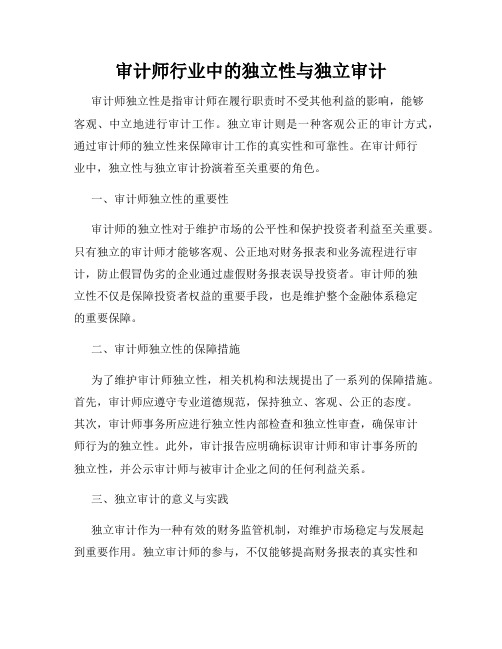
审计师行业中的独立性与独立审计审计师独立性是指审计师在履行职责时不受其他利益的影响,能够客观、中立地进行审计工作。
独立审计则是一种客观公正的审计方式,通过审计师的独立性来保障审计工作的真实性和可靠性。
在审计师行业中,独立性与独立审计扮演着至关重要的角色。
一、审计师独立性的重要性审计师的独立性对于维护市场的公平性和保护投资者利益至关重要。
只有独立的审计师才能够客观、公正地对财务报表和业务流程进行审计,防止假冒伪劣的企业通过虚假财务报表误导投资者。
审计师的独立性不仅是保障投资者权益的重要手段,也是维护整个金融体系稳定的重要保障。
二、审计师独立性的保障措施为了维护审计师独立性,相关机构和法规提出了一系列的保障措施。
首先,审计师应遵守专业道德规范,保持独立、客观、公正的态度。
其次,审计师事务所应进行独立性内部检查和独立性审查,确保审计师行为的独立性。
此外,审计报告应明确标识审计师和审计事务所的独立性,并公示审计师与被审计企业之间的任何利益关系。
三、独立审计的意义与实践独立审计作为一种有效的财务监管机制,对维护市场稳定与发展起到重要作用。
独立审计师的参与,不仅能够提高财务报表的真实性和可靠性,还能够为投资者提供有价值的信息,促进市场监管机构的有效监督,并维护企业的声誉和形象。
在实践中,独立审计需要依赖于完善的法律法规以及行业准则的支持,只有这样才能确保审计师的独立性和审计工作的公正性。
此外,审计机构应该建立健全的内部控制制度,为审计师提供必要的独立工作环境和资源支持。
同时,监管部门应对审计师行为进行监督,并依法对违规行为进行严厉处罚。
四、面临的挑战与应对策略审计师行业面临着各种挑战,如潜在的经济利益冲突、对审计师的不公正压力等。
为了应对这些挑战,需要进一步完善审计师独立性保障措施。
一方面,需要加强培训和教育,提高审计师的专业素养和独立审视能力。
另一方面,应加强监管力度,强化对审计机构和审计师的监督,发现并处理独立性问题。
审计师的独立性,行为和道德,外文文献
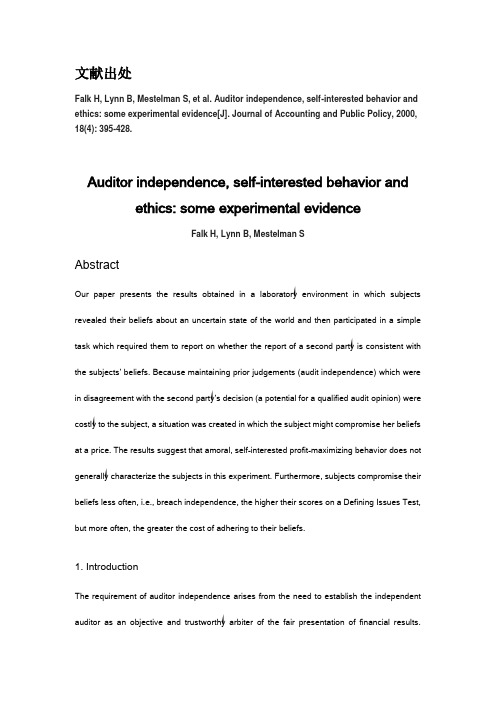
文献出处Falk H, Lynn B, Mestelman S, et al. Auditor independence, self-interested behavior and ethics: some experimental evidence[J]. Journal of Accounting and Public Policy, 2000, 18(4): 395-428.Auditor independence, self-interested behavior and ethics: some experimental evidenceFalk H, Lynn B, Mestelman SAbstractOur paper presents the results obtained in a laboratory environment in which subjects revealed their beliefs about an uncertain state of the world and then participated in a simple task which required them to report on whether the report of a second party is consistent with the subjects’ beliefs. Because maintaining prior judgements (audit independence) which were in disagreement with the second party’s decision (a potential for a qualified audit opinion) were costly to the subject, a situation was created in which the subject might compromise her beliefs at a price. The results suggest that amoral, self-interested profit-maximizing behavior does not generally characterize the subjects in this experiment. Furthermore, subjects compromise their beliefs less often, i.e., breach independence, the higher their scores on a Defining Issues Test, but more often, the greater the cost of adhering to their beliefs.1. IntroductionThe requirement of auditor independence arises from the need to establish the independent auditor as an objective and trustworthy arbiter of the fair presentation of financial results.Indeed, Mautz and Sharaf (1961, pp. 204–231) and Berryman (1974, p. 1) posit that independence is the cornerstone of the audit profession and an essential ingredient of users’ confidence in financial statements. Since independent auditors occupy a position of trust between the management of the reporting entity and users of its financial statements, they must be perceived to be operating independently on the basis of sound auditing standards and strong ethical principles.Examinations of the independence issue over the last three decades, such as the United States Senate et al., 1976, United States Senate (Moss Committee), 1978 and The Commission on Auditors’Responsibilities (Cohen Commission), 1978, and Treadway (1987) Commissions and the Advisory Panel on Auditor Independence (1994) have all emphasized the importance of independence as a critical factor of professional conduct. Moreover, the US Supreme Court, in United States v. Arthur Young & Co. et al. 1984 (1986, p. 818), has ruled that the independent auditor must “maintain total independence from the client at all tim es”.Codes of professional conduct, such as those of the American Institute of Certified Public Accountants (AICPA), the Canadian Institute of Chartered Accountants, and the Institute of Chartered Accountants of Ontario require that a member “in public pra ctice be independent in fact and in appearance…” (Pany and Whittington, 1994, p. 94).1 Whereas the literature is replete with studies that model auditors’ decisions of whether to preserve or compromise their independence under various circumstances Antle, 1984,DeAngelo, 1981, Goldman and Barlev, 1974, Kanodia and Mukherji, 1994, Magee and Tseng, 1990,Yoon, 1990, Penno and Watts, 1991 and Yost, 1995, studies that attempt to observe independence directly are quitesparse.2 Furthermore, research which tries to link audit independence and ethical propensity is rare Ponemon and Gabhart, 1990 and Windsor and Ashkanasy, 1995. We report on actual observations, obtained via a controlled laboratory experiment concerning decisions to compromise or preserve independence in the case of client–auditor disagreements about a reporting decision. Outside this controlled environment these inconsistent decisions or breaches of independence are unobservable and, hence, theories about their occurrence are largely untestable using field data. Furthermore, we combine and extend two important streams in the audit literature: (1) Magee's and Tseng's (1990) and Antle's (1984) analytical modelling of audit independence and (2) Ponemon's and Gabhart's (1990) and Windsor's and Ashkanasy (1995) empirical tests of the relation between moral development and auditor independence.We assume the Magee and Tseng (1990, pp. 318–320) audit framework and devise an experimental audit task which focuses on a test of whether subjects exercise independent judgement based on their prior beliefs. Because our controlled laboratory environment includes explicit monetary incentives (economic motivation) both as positive payoffs and negative penalties, we feel that the method allows us to make a more direct evaluation of subjects’ behavior and its relation to their moral development than either Ponemon and Gabhart (1990) or Windsor and Ashkanasy (1995) were able to do using their hypothetical audit case experiments. While Ponemon (1993) did attempt to link an economic decision (a free rider/Prisoner’s Dilemma situation) with moral development and ethical education,3 his classroom setting did not have the formal controls available in the laboratory environment. Essentially, our study uses a proxy variable for moral development to control for the potentialimpact of moral choice on what is largely a test of economic rationality in an audit setting. Our results show that:1.As the probability of losing a client by disagreeing with the client’s decision increases, the frequency of independence violations increases. This result is independent of whether the independent auditors’ behavior is monitored.2.Monitoring and penalizing independent auditors’ behavior reduce the frequency of independence violations when the probability of losing a client is small, but the frequency of violations is not reduced when the probability of the loss of a client is high.3.On average, subjects with low moral development scores violate independence more frequently than those who have higher scores.These results suggest that while external review and potential penalties (litigation costs, loss of reputation, direct fines or licence suspension) may reduce violations of auditor independence somewhat, the positive reinforcement of the attribute may come from increasing independent auditors’ awareness of the ethical dimensions of their decisions. Using a different research method, our results also validate Ponemon and Gabhart's (1990, pp. 240–247) and Windsor’s and Ashkanasy’s (1995, pp. 715–717) findings on the significance of moral development to auditor independence.The next section provides a review of the research on ethics and auditing, including a discussion of the moral development literature from developmental psychology which is used in the present study. We then provide a general framework for our study, describe the research design and hypotheses, and discuss the results of the experiment. Finally, we draw conclusions from the results and identify opportunities for extending the research.2. Auditing and ethical backgroundPrior research on auditor independence has largely concentrated either on modelling the independent auditor’s judgement or on s ituations where auditors may breach their required independence. Studies such as Dopuch and King, 1991 and Schatzberg,1990 and Schatzberg and Sevcik (1994) have attempted to study the concept of independence in audit settings, but do not provide direct observations of subjects’ independence as does the present study.4 In the studies cited, audit independence (or lack thereof) is revealed by agreement or disagreement with management’s portrayal of a financial reporting dilemma of some description. While the studies use experimental techniques, none of them attempt to assess the independent auditor’s prior beliefs or expectations vis à vis the situation. Such an assessment is central to our present experimental treatment and forms the basis of determining whether a subject has behaved independently or has compromised prior beliefs.The suggestion that when external auditors exercise independent judgement about financial statements, they are engaging in what is tantamount to an ethical act, is not a novel idea. Codes of ethics such as those used by the American Institute of Certified Public Accountants and the Canadian Institute of Chartered Accountants are normally designed to motivate members of professional organizations to operate in an ethical manner. Prior studies suggest, however, that the underlying psychology that governs professional behavior is more complicated t han simply hoping that professionals adhere to the organization’s code of conduct. For example, Lampe and Finn (1992, pp. 34–55) compared the auditors’ ethi cal decision process model they developed to an AICPA Code decision model and concluded (pp. 55–56) that the latter is insufficient to motivate accountants to pursue ethical behavior. Similarly, Ponemon (1988, 1990, 1992a, b, 1993, 1995), Ponemon and Gabhart (1993) and Ponemon and Glazer (1990)utilized theories of cognitive-developmental psychology (described below) to elucidate the ethical dimensions of accountants’ judgementprocedures and generally concluded that the ethical culture of the firm and domain-specific experience coupled with ethical reasoning are significantly related to accountants’ ethical behavior.More specifically, Ponemon and Gabhart (1990, pp. 240–247) and Windsor and Ashkanasy (1995, pp. 709–714) have established that the degree of moral development helps to explain external auditors’ independence behavior. Cushing (1990, p. 254) expressed concern about Ponemon’s and Gabhart’s(1990) chosen scenario (a management advisory task of whether the independent auditors should help to hire a financial officer for a firm for whom they provide audit service) because it did not imply explicit, measurable economic consequences. Windsor and Ashkanasy (1995, p. 702) tried to answer Cushing’s comments by constructing an auditing case involving a materiality dilemma about an error in an accounting balance to be reported on the financial statements. Windsor and Ashkanasy (1995, pp. 702–707) also enriched their analysis by incorporating the economic environs (the client’s financial health and probability of tendering) and the independent auditor’s beliefs (level of moral development and the concept of belief in justice) as variables which influence the auditor’s exercise of independence.Many of these studies of accounting and business ethical judgements (such as those by Ponemon cited above) are grounded in the theory of the developmental stages of moral reasoning begun by Piaget (1965) and formalized by Kohlberg, 1969 and Kohlberg, 1976. Kohlberg (1976, pp. 33–35) bases his stage theory of moral development on the concept of justice by which individuals make moral judgements, a concept which changes as individuals mature and proceed through their education. Kohlberg (1969, pp. 382–391)identifies three levels of moral development each of which represents two distinct stages of moral reasoning:•Level 1, the “preconventional” level where moral reasoning is guided either by fear of punishment(Stage 1) or by self-interest, i.e., satisfying one’s own needs (Stage 2).•Level 2, the “conventional” level where moral reasoning is guided either by the wish to please or help others (Stage 3) or by the desire to fulfil societal, legal or religious norms, i.e., ruled-based reasoning (Stage 4).•Level 3, the “postconventional” level, where moral reasoning derives from either general, individual rights and socially accepted standards, i.e., a social contract (Stage5) or from universal ethical principles as defined by the decision-maker’s conscience(Stage 6).Kohlberg’s(1969) stage theory of moral development suggests that moral reasoning grows from a simple obedience, fear-of-punishment orientation where justice is seen as external authority to an independent judgement based on universal ethical ideals, where justice is an internal construct. In Kohlberg (1969), the concept of justice thus shifts from something externally imposed to something internally defined and mediated by the individual conscience. Rest (1979) developed a Defining Issues Test (DIT) to assess subjects’ moral development. Elm and Weber (1994, pp. 351–354) compare the development stages described by Kohlberg (1969) and Rest (1979) and found them subtly different. The DIT hasbeen proven to be a reliable instrument in hundreds of studies (Rest et al., 1986, pp. 28–58) and is basically a recognition task that uses a series of dilemmas (three or six stories) presented as short moral scenarios.The DIT (Rest et al., 1986, pp. 185–200) requires participants to choose an action which they believe will resolve the dilemma and then to rank the reasons for their choice from the set of responses provided. The response set for each dilemma includes rationales based on the six stages of moral development and the test is scored by totalling the proportion of responses indicating each of the stages of reasoning. The most commonly used scores from the DIT are the p-score and the d-score. The p-score represents the proportion of stages five and six reasoning used to rationalize the dilemmas, and the d-score is a comprehensive overall score based on reasoning across all stages (Rest, 1990, pp. 4.2–4.3).Researchers have used the DIT results to study a number of aspects of moral development across age groups, educational levels, political persuasions and across cultures.5Blasi (1980, pp. 17–25) has summarized the results of using the DIT scores as a control variable in psychological experiments on cheating behavior. More recently, Trevino and Youngblood (1990), Elm and Nichols (1993), Ferrel and Skinner (1998), Laczhiak and Interredian (1987), and Singhapakdi and Vittel (1990) have used the DIT results as one of the explanatory variables for studies of managerial behavior in business settings, focusing mainly on the issues such as kickbacks, cheating on business expenses, and knowledge of faulty products. Ponemon (1990, 1992a, 1995) has undertaken several studies which analyze the association between moral development (via the DIT) and professional accountants’behavior. Ponemon and Gabhart (1990) and Windsor and Ashkanasy (1995) both use the DIT scores as the proxy for moral development in their studies of auditor independence.Church et al. (1994) used DIT scores in an experiment assessing the relative strength of altruism versus economic self interest. Our study goes beyond previous studies by using DIT scores as a control va riable to proxy moral development to determine whether subjects’ moral reasoning has a moderating effect on strict economic rationality. We consider the moral dimension in an audit experiment, testing, inter alia, whether higher moral development, i.e., a higher d-score, results in more independent audit choices. 6The model of auditor independence that forms the basis of our laboratory experiment thus provides a direct test of whether subjects’ behavior is driven solely by economic rationality or is moderated by their degree of moral development. Having reviewed the ethical and auditing background to our study we next look at the general framework we use and then describe the actual conduct of the experiment.3. General frameworkThe setting in our experiment captures an important aspect of the naturally occurring audit environment and follows the general pattern of prior analytical studies (e.g., Magee and Tseng, 1990) in which a client prepares financial statements and chooses reporting practices from available alternatives.7 In our experiment, an independent auditor is hired to perform the mandatory audit and to express an opinion whether the financial statements present fairly the client’s financial position. Audit c ontracts are not binding for more than one period, but it is expected that, in the absence of a client–auditor disagreement that the audit contract will berenewed periodically. In contrast to DeAngelo (1981) and consistent withElitzur and Falk (1996a) we assume that the entire expected engagement period is finite.8As in Penno and Watts (1991, p. 207) we define “an independent auditor as one whose preferences over financial reporting alternatives are unaffected by management’s preferences”. When the client’s reporting practice does not match the independent auditor’s preference, a client–auditor disagreement occurs, which may result in compromising independence if the auditors remove their objection to the client’s choice. If the conflict is not resolved the auditor will qualify the opinion on the client’s financial statements.If independent auditors are assumed to be rational profit maximizers, their decision to compromise independence depends on whether the expected cost of preserving independence outweighs the expected benefits from compromising it. In the absence of external intervention, such as lawsuits by a third party or disciplinary action by oversight bodies, if the independent auditors compromise their independence they are retained by the client for future audit engagements. Where the independent auditors face a probability of peer review that may reveal the breach, the decision to compromise independence may result in costly disciplinary sanctions, loss of reputation and market share. If external auditors preserve independence, and qualify their report, they face a threat of dismissal by their clients, which involves loss of future audit fees and a possible reputation effect arising from the loss of their clients. In a mandatory audit environment, however, a client’s threat of dismissal may be credible only if there is at least one competing independent auditor who does not object to this client’s reporting choice.While independent auditors are expected to behave as rational economic agents, it is possible that their decisions are also affected by their moral perspective. When moral behavior conflicts with economic rationality, independent auditors with higher moral reasoning are expected to exhibit more consistent, independent behavior than those with lower moral reasoning, even in the absence of monitoring and penalties. As Ponemon and Gabhart (1990, pp. 240–244) and Windsor and Ashkanasy (1995, pp. 711–712) have shown, moral development has some relation to independent audit judgement.Membership in a professional accounting organization, one of whose requirements is adherence to a code of professional ethics, adds an additional bonding element to the client–auditor relationship Watts and Zimermann, 1986 and Matthews, 1991. Indeed, intensified peer reviews Yoon, 1990 and Advisory Panel on Auditor Independence, 1994 and stiff penalties for compromising independence provisions have been suggested as a means of enhancing auditor independence Goldman and Barlev, 1974,Ponemon and Gabhart, 1990, Shockley, 1982, Elitzur and Falk, 1996a and Windsor and Ashkanasy, 1995. In this context we examine the independent auditor’s behavior in three client–auditor disagreement settings. A description of the auditing context of the settings follows.In each setting we assume a finite total engagement period. As in Magee and Tseng (1990, pp. 318–320)we distinguish between the cases where there are and where there are not replacement auditors available. In the baseline setting there is no replacement independent auditor available. In the two other settings we assume that there is at least one competing independent auditor who agrees with the client and who is as efficient as the incumbent auditor with respect to the client’s audit. Similar to Magee and Tseng (1990, p. 329) we assume thatthe price of the periodic audit by an incumbent auditor will be M t=ν + βt, where M t is the audit fee for period t, ν is the normal audit cost that is the same for all equally efficient auditors, and βt is the learning cost that a competing auditor must assume and incorporate in a bid for an audit in period t. Because the alignment between the client’s and incumbent independent auditor’s information systems increases over time ( Antle 1982, pp. 506–508; 1984, pp. 8–10), βt is increasing over time and M t is increasing over time. 9 We, therefore, structured the periodic expected income to the incumbent independent auditor accordingly. 10 However, under the realistic assumptions that the marginal learning cost to a competitor is less than the normal audit cost and that any penalty for compromising independence is not increasing over time, the total expected payoff to the incumbent independent auditor, from the remaining total audit engagement, is decreasing over time. To maintain consistency across settings, we used the same structure of periodic income from fees in all three settings. The three settings created in the laboratory are described below.•Setting 1: There are no penalties against preserving independence (no competing independent auditor who may side with the client is available). When the client cannot threaten contract termination, as is the case, for example, in France and Spain where the auditor must be retained by law for a minimum number of years there is no cost difference between a qualified and unqualified report regardless of what the client reports (Coopers & Lybrand, 1991, pp. I-32, S-56). 11 This holds for each period of the audit engagement.•Setting 2: There is a positive probability that the independent auditor will lose the client if the auditor chooses to qualify the report (there is one competing auditor who sides with the client). Regardless of what the client reports, the independent auditor’s expected profit is greater if an unqualified report is issued than if a qualified report is issued. This holds for each period of the audit engagement. However, given the discussion about the T period engagement, the differences between the expected profits associated with a qualified report and an unqualified report fall over time.•Setting 3: There is a positive probability that, in addition to the threat of termination which characterizes Setting 2, the independent auditor may be peer reviewed and will be penalized (a threat of external review) when found to have compromised independence. When the client’s report is inconsistent with the independent auditor’s belief, the relationship between the economic values of issuing a qualified report versus an unqualified report is not the same across the periods of the audit engagement. In the first period, for example, the cost of an unqualified report to the independent auditor will be the loss of the client plus a penalty if the independent auditor is peer-reviewed, while a qualified report will only result in losing the client because of the disagreement. The expected cost of issuing a qualified report will be greater than the cost of issuing an unqualified report. In the last period, however, there is no cost to issuing a qualified report, but there is still a cost associated with issuing an unqualified report because of the potential peer-review. Between the first and last period, the differences between the expected costs of issuing a qualified or unqualifiedreport will switch from positive to negative. Whether the economic value of an unqualified report is greater than, equal to or less than the economic value of a qualified report depends upon the probability of peer review, the penalty if the auditor is found compromising independence, the probability that the auditor will lose the client if a qualified report is filed, and the period during the audit engagement in which the report must be issued.In Setting 1 the independent auditor’s choice between filing a qualified or unqualified report when a client’s decision is inconsistent with the independent auditor’s belief cannot be determined on economic grounds alone. The ext ent to which the independent auditor’s beliefs are relevant to the auditor’s decisions will be important. In Setting 2 the independent auditor’s decision could be made solely on economic grounds, however, the independent auditor’s beliefs could introduce an opposing influence to the economic incentives and lead to a different outcome than would amoral, self-interested, profit-maximizing decision-making. Finally, in Setting 3, predictions about the independent auditor’s behavior and the role of beliefs and economic gain cannot be made without more detailed information about the auditor’s environment. Changing settings permits tests of how subjects respond to changes in the probability of losing a client or in the probability of being caught. But without introducing the multi-period decision cycles it is not possible to create an environment in which the threat of losing a client is credible. In addition, this provides an opportunity to change the cost of maintaining independence without changing the underlying probability of losing a client.Section 4 introduces the research design and procedures we will follow to operationalize the more general framework which is comparable in nature to independent auditor’s decisions in a naturally occurring environment.4. Research design and procedures4.1. DesignWe designed a controlled laboratory experiment to test self-interested choice behavior in a quasi-auditing task. The design involved three discrete sessions with no overlap of subjects, allowing us to examine both within group and between group observations under the three settings: (1) no threat of client loss, (2) threat of client loss, and (3) threat of client loss with external intervention and penalties.Three sessions were conducted at the University of the Philippines in the summer of 1995 using subjects recruited from the undergraduate business program.12 Each session was identical in all respects except that under Settings 2 and 3, the probability of losing a client if the auditor disagreed with the client was manipulated at three levels (between groups condition). For session 1 the probability was 10%, for session 2, 25% and for session 3, 40%. We introduced the escalating probabilities of client loss between the sessions to increase the motivation for subjects to make inconsistent choices (compromise independence) since the potential for lost payoffs rose as the probabilities increased. As well, the variation of probabilities of client loss allowed us to test the effect of external intervention and penalties on the behavior of subjects (between groups) facing different potential client loss functions.4.2. ProceduresAt each of the three sessions conducted, the subjects were assigned seats as they arrived. Seats were organized in a classroom setting and were separated sufficiently to prevent face-to-face contact between subjects and to maintain privacy.Professor Shehata (one of the co-authors) explained the environment to the subjects and provided them with written instructions. Subjects were told that while their earnings in the game would be assigned in laboratory currency called francs, the francs that they earned would be converted into Philippine pesos at the end of the session. As part of the instructions, Professor Shehata also communicated the exchange rate to convert francs to pesos.13After explaining the compensation scheme to the subjects, Professor Shehata described the decisions the subjects were to make. Professor Shehata told subjects that they were to assume the role of a reviewer who has been hired by the owners of a firm to examine whether the firm’s manager’s production decisions have been appropriate, given the production environment. For each firm, one of two products (X or Y) can be produced depending on the production environment. If the production environment is good then producing product X would maximize the owner’s wealth. If the condition is bad, then product Y is the optimal production choice. The environment condition is expected to last for a complete business cycle of four periods. Owners are unable to predict ex ante which product should be produced to maximize their wealth. Managers might find it in their best interests to produce inappropriate products (from the owner’s perspective) or to c hange products from period to period within a cycle. 14 The subject reviewers, who knew the probability that a production condition was good, were told that their task was to monitor and validate the appropriateness of the managerial。
会计师审计论文:注册会计师审计独立性探讨
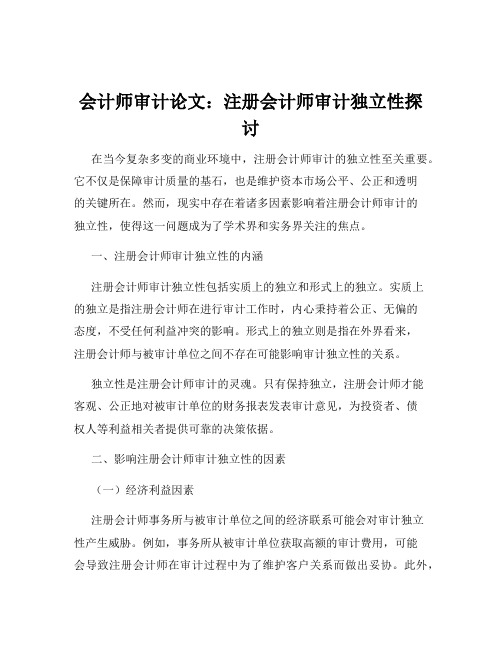
会计师审计论文:注册会计师审计独立性探讨在当今复杂多变的商业环境中,注册会计师审计的独立性至关重要。
它不仅是保障审计质量的基石,也是维护资本市场公平、公正和透明的关键所在。
然而,现实中存在着诸多因素影响着注册会计师审计的独立性,使得这一问题成为了学术界和实务界关注的焦点。
一、注册会计师审计独立性的内涵注册会计师审计独立性包括实质上的独立和形式上的独立。
实质上的独立是指注册会计师在进行审计工作时,内心秉持着公正、无偏的态度,不受任何利益冲突的影响。
形式上的独立则是指在外界看来,注册会计师与被审计单位之间不存在可能影响审计独立性的关系。
独立性是注册会计师审计的灵魂。
只有保持独立,注册会计师才能客观、公正地对被审计单位的财务报表发表审计意见,为投资者、债权人等利益相关者提供可靠的决策依据。
二、影响注册会计师审计独立性的因素(一)经济利益因素注册会计师事务所与被审计单位之间的经济联系可能会对审计独立性产生威胁。
例如,事务所从被审计单位获取高额的审计费用,可能会导致注册会计师在审计过程中为了维护客户关系而做出妥协。
此外,如果事务所为被审计单位提供非审计服务,如咨询服务等,也可能因为经济利益的交织而影响审计的独立性。
(二)关系密切因素当注册会计师与被审计单位的管理层或员工存在密切的关系,如亲属关系、长期的业务往来等,可能会在潜意识中影响其审计判断。
这种关系可能导致注册会计师在面对审计问题时难以保持客观和公正。
(三)外部压力因素来自政府部门、监管机构或被审计单位的压力可能会影响注册会计师的审计独立性。
例如,政府部门可能为了某些政策目标而对审计结果施加影响,被审计单位可能以威胁更换审计师等方式向注册会计师施压。
(四)自我利益因素注册会计师个人可能为了追求自身的职业发展、声誉或经济利益,而在审计过程中违背独立性原则。
例如,为了迎合上级或获取更多的业务机会,而放弃坚持独立的审计立场。
三、注册会计师审计独立性缺失的危害(一)损害投资者利益如果审计报告失去独立性和可靠性,投资者可能会基于错误的信息做出投资决策,从而遭受经济损失。
注册会计师审计独立性问题研究

注册会计师审计独立性问题研究作者:陈树华来源:《商场现代化》2012年第29期[摘要]审计并非从来就有,而是社会经济发展到一定阶段的产物。
当公司的经营出现了所有权与控制权分离时,委托人与代理人之间的利益冲突与代理问题导致了审计的产生,审计一经产生便为解决代理问题而存在,而为了保证审计能够解决既有的代理问题,审计师必须保持一定的独立性。
可以说自审计行业出现起,审计独立性问题便一直是理论界与实务界关注的焦点,当然也是争议最多的问题之一。
文章主要就此问题进行探讨。
[关键词]审计独立性审计学注册会计师为了实现减少代理成本的职能,审计师必须保持良好的独立性,如果缺乏独立性,无论审计师具有多好的专业技能,能够辨别怎样复杂的会计信息,也因不能如实报告审计发现,审计的固有功能也得不到实现,影响了独立审计在信息传递和降低代理成本上的积极作用。
因而,审计独立性一直被认为是审计师的灵魂。
如果审计师不独立,他的意见便失去了任何意义,审计师不仅有责任保持实际上的独立性,而且要避免缺乏形式上的独立性。
一、注册会计师审计独立性的特征审计监督是经济管型的重要组成部分。
较之其它经济监督种类,审计监督有两个最基本的特征,即独立性与权威性,这是审计监督与其它经济监督相区别的标志。
审计不同于其他经济监督,其根本原因在于,审计是一项具有独立性的经济监督活动。
独立性是审计的灵魂与生命,没有独立性就没有审计。
独立性是审计有别于其他经济监督的最根本特征。
并且,独立性是客观性、公正性的基础和保证。
但是审计的独立性往往会因审计类别不同而在程度上有所差别。
如政府审计的独立性要强于内部审计。
独立性最强的是注册会计师审计。
审计的独立性主要表现在以下四个方面:1.组织机构独立审计组织机构应独立于被审计单位。
在我国,各级政府审计机关均独立于同级人民政府的财政主管部门,注册会计师审计机构是完全独立的社会中介机构,其独立性最明显。
比较而言,内部审计机构则具有相对独立性,即内部审计机构相对于本部门、本单位其他职能部门(特别是财务会计部门)是独立设置。
CISA认证学习指南(第4版) 注册信息系统审计师-试读
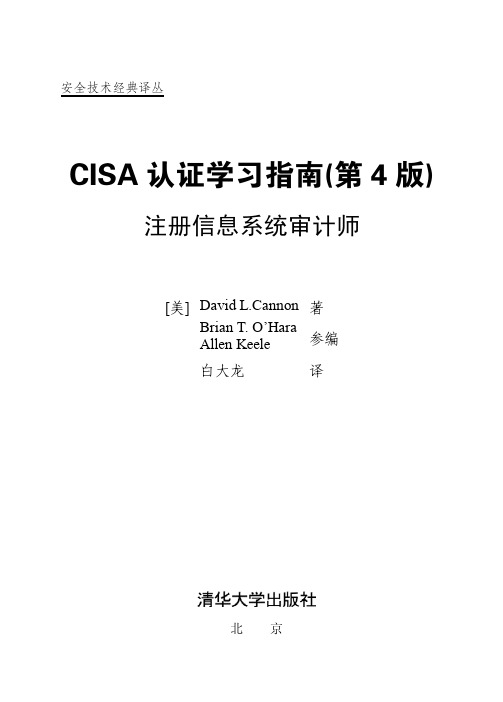
CISA 认证学习指南(第 4 版)
注册信息系统审计师
[美] David L.Cannon 著
Brian T. O’Hara Allen Keele
参编
白大龙
译
北京
David L.Cannon, Brian T. O’Hara, Allen Keele CISA: Certified Information Systems Auditor Study Guide, Fourth Edition ISBN:978-1-119-05624-9 Copyright © 2016 by John Wiley & Sons, Inc., Indianapolis, Indiana All Rights Reserved. This translation published under license.
(安全技术经典译丛) 书名原文:CISA: Certified Information Systems Auditor Study Guide, Fourth Edition ISBN 978-7-302-47809-6
Ⅰ. ①C… Ⅱ. ①D… ②白… Ⅲ. ①审计-资格考试-自学参考资料 Ⅳ. ①F239
本书中文简体字版由 Wiley Publishing, Inc. 授权清华大学出版社出版。未经出版者书面许可,不得以任何方式 复制或抄袭本书内容。
北京市版权局著作权合同登记号 图字:01-2016-9509 Copies of this book sold without a Wiley sticker on the cover are unauthorized and illegal.
● 组织关键集团执行开发会议建立跨越企业的专业管理能力。 ● 领导程序类项目启动和部署。 ● 帮助组织定义操作风险评估和业务影响评估所需的风险背景、标准和范围。 ● 帮助组织制定正式的风险评估和风险处置方法。 ● 引导风险所有者和审计人员进行操作风险评估、信息安全评估、欺诈风险评估和
变化中地会计师审计独立性——与当前环境与时俱进外文原文
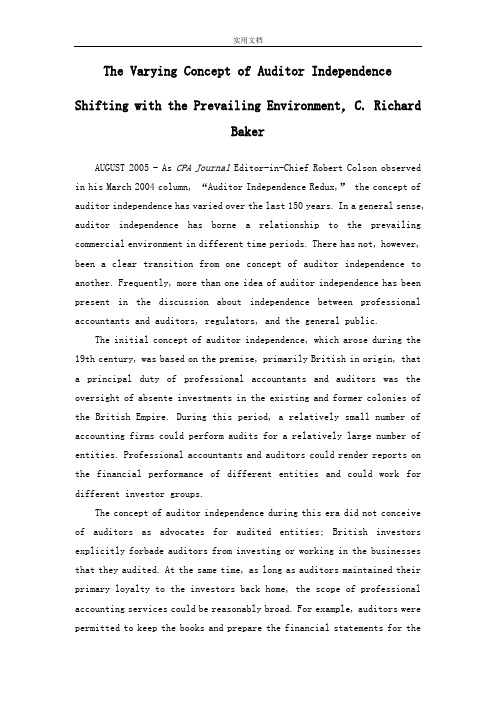
The Varying Concept of Auditor Independence Shifting with the Prevailing Environment,C. RichardBakerAUGUST 2005 - As CPA Journal Editor-in-Chief Robert Colson observed in his March 2004 column, “Auditor Independence Redux,” the concept of auditor independence has varied over the last 150 years. In a general sense, auditor independence has borne a relationship to the prevailing commercial environment in different time periods. There has not, however, been a clear transition from one concept of auditor independence to another. Frequently, more than one idea of auditor independence has been present in the discussion about independence between professional accountants and auditors, regulators, and the general public.The initial concept of auditor independence, which arose during the 19th century, was based on the premise, primarily British in origin, that a principal duty of professional accountants and auditors was the oversight of absente investments in the existing and former colonies of the British Empire. During this period, a relatively small number of accounting firms could perform audits for a relatively large number of entities. Professional accountants and auditors could render reports on the financial performance of different entities and could work for different investor groups.The concept of auditor independence during this era did not conceive of auditors as advocates for audited entities; British investors explicitly forbade auditors from investing or working in the businesses that they audited. At the same time, as long as auditors maintained their primary loyalty to the investors back home, the scope of professional accounting services could be reasonably broad. For example, auditors were permitted to keep the books and prepare the financial statements for theentities they audited.This initial concept of auditor independence changed during the late 19th and early 20th centuries. During this time, there was an economic shift from capital coming primarily from foreign sources to capital deriving primarily from domestic sources. This change was associated with the emergence of large American corporations in industries such as mining, railroads, energy, and telegraph and telephone. The emergence of large American corporations was accompanied by a change in the understanding of the purpose and nature of the business corporation. In the 1930s, noted economists Adolf Bearle and Gardiner Means articulated this change by advancing the proposition that large corporations were based on the separation of ownership from management and that an important role for accounting and auditing was to properly value the proprietary interest of the corporation. In the context of this new idea of the corporation, the auditor’s primary duty was to serve the needs of the collective proprietary interest rather than a specific absentee-ownership interest. This collective proprietary interest essentially comprised domestic shareholders, that were often large banks or wealthy investors, but increasingly the general public has become involved in stock ownership.The passage of the federal securities acts during the New Deal era, and the creation of the SEC, led to another transition in the concept of auditor independence. The SEC’s most important effect on auditor independence derived from its efforts to establish standards for financial reporting and auditing. Because of these efforts, public accountants and auditors no longer accepted that their primary responsibility was to a specific absentee owner, or to a collective proprietary interest, but rather to a set of professional standards established for the preparation and audit of financial statements. The concept of auditor independence shifted in favor of objectivity and neutrality in the reporting of the financial position and the results ofoperations, rather than loyalty to a particular party. This view was articulated academically and intellectually by Professor W.A. Paton, who stressed the entity view of corporate financial reporting.The objective and neutral concept of auditor independence prevailed until the 1970s, when FASB was established as the authoritative independent accounting standards setter. From approximately that time, public accounting firms began to modify their objective and neutral focus and started advocating for their audit clients with regard to accounting and auditing matters. Simultaneously, the rapid growth of business enterprises on a worldwide basis provided large public accounting firms with an opportunity to become the preferred providers of a wide spectrum of business services, the revenues from which quickly outpaced the fees from traditional auditing services. While the standards issued by the Auditing Standards Board (ASB) of the AICPA continued to stress independence from clients, the increasingly competitive marketplace for audit services, along with the complexity of international business practices, led some auditors to reduce their focus on objective and neutral interpretation of accounting standards in favor of becoming a trusted advisor for clients.Subsequent to the accounting and auditing scandals of the early 2000s, and the passage of the Sarbanes-Oxley Act of 2002 (SOA), the idea of auditors as trusted advisors appears to have become increasingly unsustainable. The parameters of a potentially new concept of auditor independence are still unfolding, but the Public Companies Accounting Oversight Board (PCAOB) seems to be stressing a concept of auditor independence that emphasizes a greater degree of separation between registered auditors and client management.Prior Debates About Auditor IndependenceThe second half of the 20th century saw various debates in both the academic and the professional literatures about auditor independence. Oneargument pertaining to auditor independence developed from idealized views of professionalism that emerged historically in both the British and the American accounting professions. For example, Thomas A. Lee, in Company Auditing, 3rd ed. (Van Nostrand Reinhold, 1986, page 89), suggested the following:An honest auditor will behave like someone who is independent, using independence to mean an attitude of mind which does not allow the viewpoints and conclusions of its possessor to become reliant on or subordinate to the influence and pressures of conflicting interests.Unfortunately, this admirable expression about auditor independence does not acknowledge that an auditor’s state of mind is not determinable, and, therefore, to conclude whether an auditor is independent pursuant to Lee’s definition is impossible.P. Moizier, in “Independence” (in Current Issues in Auditing, edited by M. Sherer and S. Turley, Paul Chapman Publishing Ltd., 1991), argued for an economic rationale for auditor independence, which was summarized as follows:There is an expectation that the auditor will have performed an audit that will have reduced the chances of a successful negligence lawsuit to a level acceptable to the auditor. In the language of economics, the auditor will perform audit work until the cost of undertaking more work is equal to the benefit the auditor derives in terms of the reduction in the risk of a successful lawsuit being possible. This then represents the minimum amount of work that the reader can expect the auditor to perform. However, all auditors are individuals with different attitudes to risk and return and so one auditor’s minimum standard of audit work will not necessarily be that of a colleague.This economic argument, while logical, would be unsustainable if certain auditors took advantage of the general presumption regarding auditor independence in order to obtain increased market share. In otherwords, for the economic argument to be effective, complete compliance with the principle of auditor independence would be required.In contrast to the professional and economic arguments for auditor independence, R.W. Bartlett, in “A Heretical Challenge to the Incantations of Audit Independence” (Accounting Horizons, vol. 5, No. 1, 1991), suggested that auditing is a sort of ceremony involving incantations about independence. Bartlett argued that there have been four kinds of “incantations” regarding auditor independence: The “smoking gun.” This is the argument that only in a few documented instances has auditor independence been found to be implicated in audit failures, at least if one accepts the evidence provided by lawsuits and prosecutions of auditors for securities fraud. Most lawsuits and prosecutions of auditors have been based on assertions of incompetence or lack of due diligence in the application of auditing standards, rather than lack of independence. An inability to obtain access to detailed records of lawsuits and other evidence about audit failures, however, makes this incantation difficult to prove.“We are doing pretty good.” Based on public opinion surveys, the public accounting profession has generally been held in high regard. Public opinion polls assessing the esteem of the profession often address issues like objectivity, reliability, and honesty, rather than independence perse. While objectivity, reliability, honesty, and independence may overlap, what “independence” actually means to the general public is unclear. Often, the public is not well informed about what auditors do.The “public good.” This incantation suggests that if too many constraints are placed on the public accounting profession’s scope of services, accounting firms will be unable to serve clients properly, thereby imposing significant costs on the public. Some public accounting firms have argued that providing nonauditing services allows them toperform better audits because they can obtain a better understanding of the client’s systems.“Trust us.” Independence is often said to be a mental state possessed by professional accountants and therefore not subject to empirical observation or quantification. This incantation is based on the idea of auditor economic self-interest; that is, auditors are assumed to maintain independence and objectivity so as not to harm their longer-term economic interests. This assumes that auditors continually evaluate the costs and benefits associated with ethical behavior and always resolve conflicts in favor of behaving ethically because doing so produces the greatest long-term economic benefit. While these assumptions may be argued, it can also be observed that the individual economic calculus of a particular auditor may weigh in favor of retaining an important client rather than being objective and independent, thus undermining the “trust us”argument.Changes in the Market That Affected Auditor IndependenceJonathan Weil, in “Behind Ways of Corporate Fraud: A Change in How Auditors Work” (The Wall Street Journal, March 25, 2004), suggests that during the 1970s and 1980s the market for audit services and the way in which audits were conducted changed, contributing to a decline in auditor independence. The first component of change was price competition. Prior to the 1970s, the AICPA Code of Conduct prohibited auditors from publicly advertising their services, from making uninvited solicitations to rival firms’ clients, and from participating in competitive bidding for audits. Under threats of antitrust action by the federal government, the AICPA was compelled to remove these prohibitions against competitive practices. As a result, competitive bidding in auditing became commonplace.The second change in how audits were conducted was an increased emphasis on “risk-based auditing.” Risk-based auditing is reasonable in that the largest amount of audit effort is placed on the greatest areasof audit risk. This logical idea assumes, however, that auditors are experts in determining the riskiest areas of a company’s operations. Unfortunately, as Enron and other business failures have demonstrated, some auditors are not sufficiently able to determine which areas of a company’s operations are subject to the greatest risks. In addition, auditors using a risk-based approach might not detect fraudulent activities. While this new concept of auditor independence may be appropriate for an auditor in certain circumstances, too often an auditor’s efforts to aid management resulted in misleading accounting numbers that concealed true economic performance. During the 1990s, it appeared that some auditors neglected their most immediate responsibility to act on behalf of third-party investors or, at a minimum, to be an objective and neutral interpreter of accounting standards.Pre–Sarbanes-Oxley Proposals to Enhance Auditor IndependenceA legal prohibition against an auditor possessing a financial interest in a client has been the cornerstone of auditor independence rules in the United States since the 1930s. Until the 1990s, this was not necessarily true in the United Kingdom and some other countries, even though prohibitions against holding financial interests were generally observed in practice because of the standards of the accounting institutes and common law.Currently, a prohibition against auditors possessing financial interests in clients is virtually a universal principle. Both the SEC and the public accounting profession have focused most of their attention regarding auditor independence on defining and enforcing prohibitions against financial interests. Elaborate rules and reporting structures have been formulated for the purpose of revealing any type of financial interest on the part of professional employees of accounting firms, their spouses, their parents, or their children. The PCAOB has adopted most of these rules, with a degree of relaxation in areas where the rules seemedunreasonable.Rotation of audit appointments. In several countries (e.g., Italy) auditors are permitted to audit a client for only a specified number of years. This type of regulation has never been seriously considered in the U.S. or the U.K., although Sarbanes-Oxley requires that individual auditors rotate off a client on a periodic basis. In France, the concept of auditor rotation is reversed: Auditors are appointed for a fixed period of time, during which time they cannot be replaced. This rule was intended to increase auditor independence, because the auditor has less fear of being fired by the client.With regard to independence standards, the PCAOB has adopted interim rule 3600T as part of its bylaws and rules. Rule 3600T reads as follows: In connection with the preparation or issuance of any audit report, a registered public accounting firm, and its associated persons, shall comply with independence standards:(a) as described in the AICPA’s Code of Professional Conduct Rule 101, and interpretations and rulings thereunder, as in existence on April 16, 2003 [AICPA Professional Standards, ET sections 101 and 191 (AICPA 2002)], to the extent not superseded or amended by the Board;(b) Standards Nos. 1, 2, and 3, and Interpretations 99-1, 00-1, and 00-2, of the Independence Standards Board, to the extent not superseded or amended by the Board.Essentially, the PCAOB has recognized the independence standards previously developed by the AICPA and the SEC through the Independence Standards Board.Reconsidering Auditor IndependenceWhat is needed now is a complete reconsideration of the concept of auditor independence. Such reconsideration might lead to a new concept in which auditor independence would be based on reasserting the accounting profession’s former ethic of being an objective and neutral interpreterof accounting standards, rather than an advocate for client positions. Given the recent and ongoing accounting and auditing scandals, it seems obvious that independent auditors should not be advocates for client positions.A new concept of auditor independence is required that specifically incorporates the propositions that: 1) auditors should not be advocates for their clients, and 2) management should not be able to influence the audit fee and the scope of the audit. Without a transition to this concept, auditor independence standards will most likely be primarily cosmetic and will not provide sufficient assurance that auditors are in fact independent from client management.。
注册会计师审计独立性研究
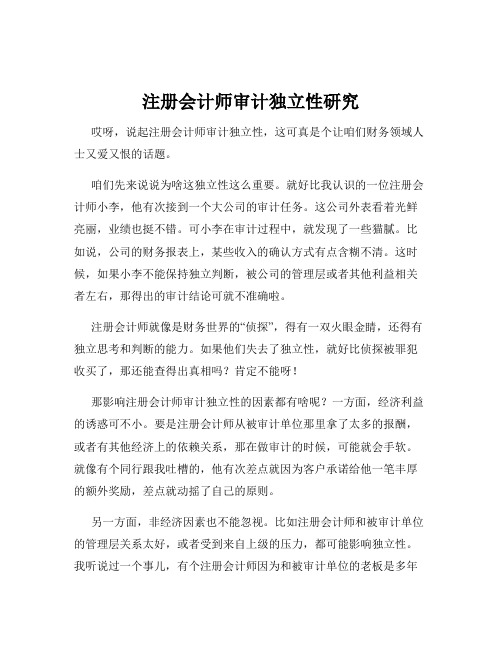
注册会计师审计独立性研究哎呀,说起注册会计师审计独立性,这可真是个让咱们财务领域人士又爱又恨的话题。
咱们先来说说为啥这独立性这么重要。
就好比我认识的一位注册会计师小李,他有次接到一个大公司的审计任务。
这公司外表看着光鲜亮丽,业绩也挺不错。
可小李在审计过程中,就发现了一些猫腻。
比如说,公司的财务报表上,某些收入的确认方式有点含糊不清。
这时候,如果小李不能保持独立判断,被公司的管理层或者其他利益相关者左右,那得出的审计结论可就不准确啦。
注册会计师就像是财务世界的“侦探”,得有一双火眼金睛,还得有独立思考和判断的能力。
如果他们失去了独立性,就好比侦探被罪犯收买了,那还能查得出真相吗?肯定不能呀!那影响注册会计师审计独立性的因素都有啥呢?一方面,经济利益的诱惑可不小。
要是注册会计师从被审计单位那里拿了太多的报酬,或者有其他经济上的依赖关系,那在做审计的时候,可能就会手软。
就像有个同行跟我吐槽的,他有次差点就因为客户承诺给他一笔丰厚的额外奖励,差点就动摇了自己的原则。
另一方面,非经济因素也不能忽视。
比如注册会计师和被审计单位的管理层关系太好,或者受到来自上级的压力,都可能影响独立性。
我听说过一个事儿,有个注册会计师因为和被审计单位的老板是多年的老同学,在审计的时候就不自觉地放松了标准,结果差点出了大问题。
那怎么来保障注册会计师的审计独立性呢?首先,得有严格的职业道德规范。
这就像是给注册会计师们戴上了“紧箍咒”,时刻提醒他们要坚守原则。
其次,监管部门也得给力,加强监督和处罚力度。
一旦发现有违反独立性原则的行为,就得严惩不贷。
还有啊,咱们得提高注册会计师的职业素养。
让他们明白,保持独立性不仅是对工作负责,也是对自己的职业声誉负责。
比如说,可以多组织一些培训和交流活动,让他们互相学习和借鉴经验。
总之,注册会计师审计独立性可不是一句空话,这关系到整个财务审计行业的公信力和公正性。
咱们得重视起来,不断努力,让注册会计师们都能挺直腰板,做出公正、准确的审计结论。
应用文-注册会计师审计独立性问题的研究
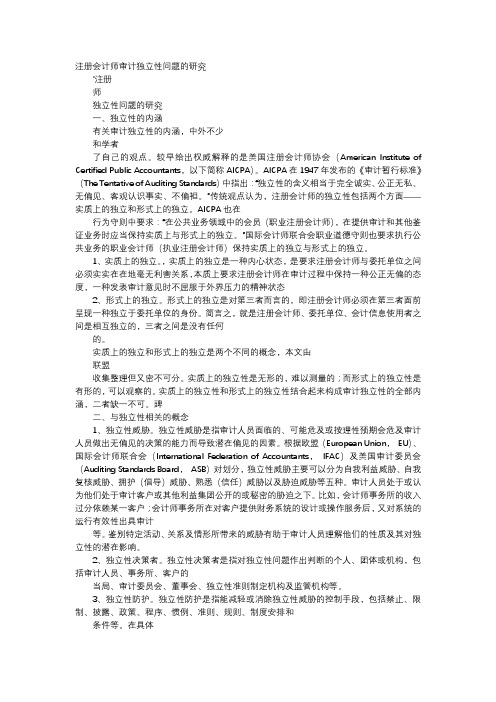
注册会计师审计独立性问题的研究'注册师独立性问题的研究一、独立性的内涵有关审计独立性的内涵,中外不少和学者了自己的观点。
较早给出权威解释的是美国注册会计师协会(American Institute of Certified Public Accountants,以下简称AICPA)。
AICPA在1947年发布的《审计暂行标准》(The Tentative of Auditing Standards)中指出:“独立性的含义相当于完全诚实、公正无私、无偏见、客观认识事实、不偏袒。
”传统观点认为,注册会计师的独立性包括两个方面——实质上的独立和形式上的独立。
AICPA也在行为守则中要求:“在公共业务领域中的会员(职业注册会计师),在提供审计和其他鉴证业务时应当保持实质上与形式上的独立。
”国际会计师联合会职业道德守则也要求执行公共业务的职业会计师(执业注册会计师)保持实质上的独立与形式上的独立。
1、实质上的独立。
,实质上的独立是一种内心状态,是要求注册会计师与委托单位之间必须实实在在地毫无利害关系,本质上要求注册会计师在审计过程中保持一种公正无偏的态度,一种发表审计意见时不屈服于外界压力的精神状态2、形式上的独立。
形式上的独立是对第三者而言的,即注册会计师必须在第三者面前呈现一种独立于委托单位的身份。
简言之,就是注册会计师、委托单位、会计信息使用者之间是相互独立的,三者之间是没有任何的。
实质上的独立和形式上的独立是两个不同的概念,本文由联盟收集整理但又密不可分。
实质上的独立性是无形的,难以测量的;而形式上的独立性是有形的,可以观察的。
实质上的独立性和形式上的独立性结合起来构成审计独立性的全部内涵,二者缺一不可。
豍二、与独立性相关的概念1、独立性威胁。
独立性威胁是指审计人员面临的、可能危及或按理性预期会危及审计人员做出无偏见的决策的能力而导致潜在偏见的因素。
根据欧盟(European Union,EU)、国际会计师联合会(International Federation of Accountants,IFAC)及美国审计委员会(Auditing Standards Board,ASB)对划分,独立性威胁主要可以分为自我利益威胁、自我复核威胁、拥护(倡导)威胁、熟悉(信任)威胁以及胁迫威胁等五种。
展望未来的审计师独立性——基于变革审计的基本制度
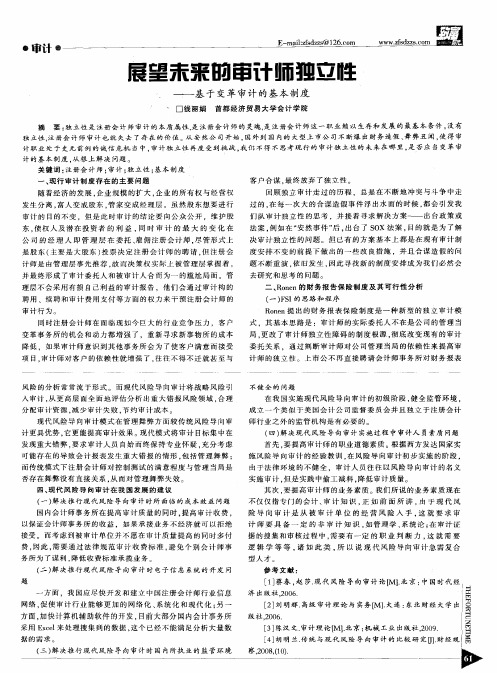
法案 , 如 在 “ 然 事 件 ” , 台 了 S X法 案 , 例 安 后 出 O 目的就 是 为 了 解
决 审计 独 立 性 的 问题 。 但 已有 的 方案 基 本 上都 是在 现有 审 计 制
是 股东 ( 要 是 大 股 东 ) 票 决 定 注 册 会 计 师 的 聘 请 , 注 册 会 主 投 但 计 师 是 由管 理 层 事 先 推荐 , 而决 策 权 实 际 上 被 管 理 层 掌 握 着 , 故 并 最 终 形 成 了审 计 委 托 人 和被 审计 人合 而 为 一 的 尴尬 局 面 。 管 理 层 不 会 采 用有 损 自己利 益 的 审计 报 告 ,他 们 会 通 过 审计 构 的 聘 用 、续 聘 和 审 计 费 用 支 付 等 方 面 的 权 力来 干 预 注 册 会计 师 的
局 。 改 了 审 计 师 独立 性 障 碍 的 制 度 根 源 , 底 改 变 现 有 的审 计 更 彻 委 托 关 系 .通 过 割 断 审 计 师 对 公 司管 理 当局 的依 赖 性 来 提 高 审 计 师 的 独 立 性 。上 市 公 不 再 直 接 聘 请 会 计 师 事 务 所 对 财 务 报 表
在 我 国 实施 现代 风 险 导 向 审计 的 初 级 阶 段 , 全 监 管 环 境 , 健
成 立 一 个 类 似 于 美 国 会 计 公 司 监 督 委 员 会 并 且 独 立 于 注 册 会 计 师 行 业 之 外 的监 管 机 构是 有 必 要 的 。
现 代 风 险 导 向审 计 模 式 在 管 理 舞 弊 方 面 较 传 统 风 险 导 向 审
审计行为。 同时 注 册 会 计 师 在 面 临 现 如今 巨 大 的行 业 竞 争压 力 ,客 户 变 革 事 务 所 的 机 会 和 动力 都 增 强 了 ,重 新 寻 求 新 事 物 所 的成 本 降 低 .如 果 审计 师 意识 到其 他 事务 所 会 为 了使 客 户满 意而 接 受 项 目 . 计 师 对 客 户 的 依 赖 性 就 增 强 了 , 往 不 得 不 迁 就 甚 至 与 审 往
经济新常态下注册会计师审计独立性的思考
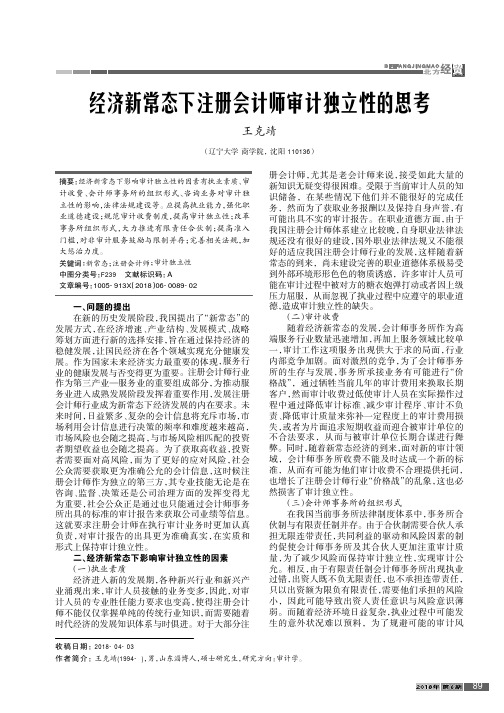
经济新常态下注册会计师审计独立性的思考王克靖(辽宁大学商学院,沈阳110136)摘要:经济新常态下影响审计独立性的因素有执业素质、审计收费、会计师事务所的组织形式、咨询业务对审计独立性的影响,法律法规建设等。
应提高执业能力,强化职业道德建设;规范审计收费制度,提高审计独立性;改革事务所组织形式,大力推进有限责任合伙制;提高准入门槛,对非审计服务鼓励与限制并存;完善相关法规,加大惩治力度。
关键词:新常态;注册会计师;审计独立性中图分类号:F239文献标识码:A文章编号:1005-913X (2018)06-0089-02收稿日期:2018-04-03作者简介:王克靖(1994-),男,山东淄博人,硕士研究生,研究方向:审计学。
一、问题的提出在新的历史发展阶段,我国提出了“新常态”的发展方式,在经济增速、产业结构、发展模式、战略筹划方面进行新的选择安排,旨在通过保持经济的稳健发展,让国民经济在各个领域实现充分健康发展。
作为国家未来经济实力最重要的体现,服务行业的健康发展与否变得更为重要。
注册会计师行业作为第三产业—服务业的重要组成部分,为推动服务业进入成熟发展阶段发挥着重要作用,发展注册会计师行业成为新常态下经济发展的内在要求。
未来时间,日益繁多、复杂的会计信息将充斥市场,市场利用会计信息进行决策的频率和难度越来越高,市场风险也会随之提高,与市场风险相匹配的投资者期望收益也会随之提高。
为了获取高收益,投资者需要面对高风险,而为了更好的应对风险,社会公众需要获取更为准确公允的会计信息,这时候注册会计师作为独立的第三方,其专业技能无论是在咨询、监督、决策还是公司治理方面的发挥变得尤为重要,社会公众正是通过也只能通过会计师事务所出具的标准的审计报告来获取公司业绩等信息。
这就要求注册会计师在执行审计业务时更加认真负责,对审计报告的出具更为准确真实,在实质和形式上保持审计独立性。
二、经济新常态下影响审计独立性的因素(一)执业素质经济进入新的发展期,各种新兴行业和新兴产业涌现出来,审计人员接触的业务变多,因此,对审计人员的专业胜任能力要求也变高,使得注册会计师不能仅仅掌握单纯的传统行业知识,而需要随着时代经济的发展知识体系与时俱进。
变化中的金融专家审计独立性——与当前环境与时俱进
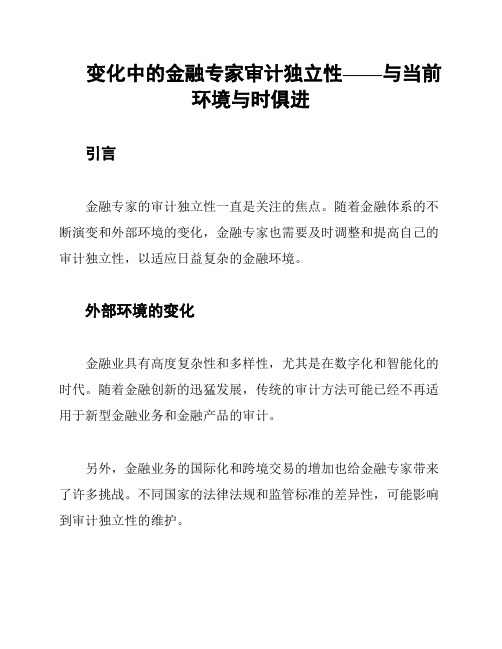
变化中的金融专家审计独立性——与当前环境与时俱进引言金融专家的审计独立性一直是关注的焦点。
随着金融体系的不断演变和外部环境的变化,金融专家也需要及时调整和提高自己的审计独立性,以适应日益复杂的金融环境。
外部环境的变化金融业具有高度复杂性和多样性,尤其是在数字化和智能化的时代。
随着金融创新的迅猛发展,传统的审计方法可能已经不再适用于新型金融业务和金融产品的审计。
另外,金融业务的国际化和跨境交易的增加也给金融专家带来了许多挑战。
不同国家的法律法规和监管标准的差异性,可能影响到审计独立性的维护。
此外,信息技术的飞速发展也给金融专家带来了新的挑战和机遇。
数据分析和人工智能等技术的应用,可能对传统审计方法和审计独立性提出新的要求。
当前环境下的应对策略为应对变化中的金融环境,金融专家需要采取一些策略来保持或提高审计独立性。
首先,金融专家应密切关注金融业务的最新变化和发展趋势。
通过持续研究和专业培训,掌握最新的金融业务知识和审计方法,从而提高自己的专业能力和审计独立性。
其次,金融专家应积极参与行业标准的制定和修订。
通过参与行业协会和组织的工作,金融专家可以推动行业审计标准的制定和修订,进一步提高审计独立性的保障。
另外,金融专家应加强与监管机构和审计委员会的合作与沟通。
与监管机构和审计委员会保持密切的合作关系,可以及时了解监管要求和审计准则的变化,从而确保自己的审计工作符合最新的要求。
最后,金融专家应注重提升技术能力和数据分析能力。
随着信息技术的进步,金融专家需要掌握先进的数据分析技术和工具,以提高审计的效率和准确性,保障审计独立性。
结论随着金融环境的不断变化,金融专家的审计独立性也需要与时俱进。
通过密切关注变化的金融环境、参与行业标准制定、加强与监管机构的合作与沟通以及提升技术能力,金融专家可以有效保持和提高审计独立性,为金融行业的可持续发展做出贡献。
10-审计人员关于独立性的声明

索引号:AC-4
XX会计师事务所
审计人员关于独立性的声明
我们按本所的指派,对公司实施年度财务报表的审计。
按照《中国注册会计师职业道德守则》与《质量控制准则第5101号——会计师事务所对执行财务报表审计和审阅、其他鉴证和相关服务业务实施的质量控制》的规定,审计人员应当保持独立性。
我们在实施该公司财务报表审计前已充分进行了关于是否保持独立性的自我评估,并将有关可能损害独立性的事项予以了充分考虑。
我们在此声明,经自我评估后我们有理由认为,在实施上述审计业务时我们已保持了审计人员应有的独立性,将不会损害我们独立发表审计意见的立场。
我们在此声明书上的亲笔签字表明我们将切实遵循独立性原则与遵守监管机构关于注册会计师执行审计业务的独立性要求等相关规定。
审计人员签字: 日期:
日期:
日期:
日期:
日期:
日期:
索引号:AD
XX会计师事务所
主要股东、关键管理人员、关联方和治理层诚信度调查问卷
客户名称:资产负债表日:
项目负责人:日期:
承接调查者姓名:与客户的关系:。
注册会计师审计独立性英文文献中英对照
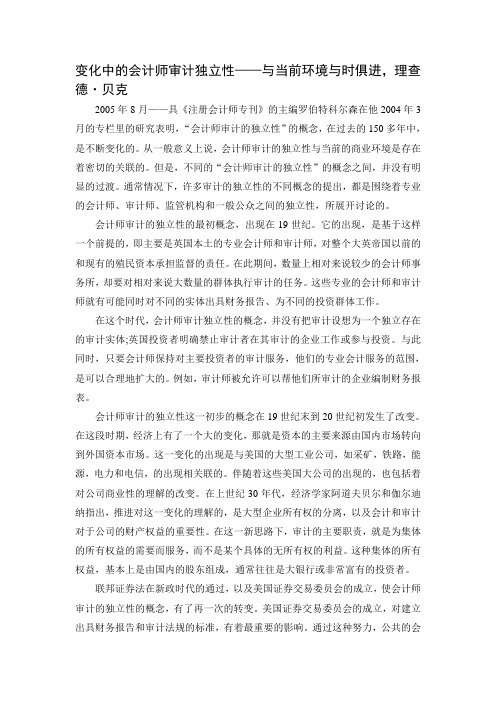
变化中的会计师审计独立性——与当前环境与时俱进,理查德·贝克2005年8月——具《注册会计师专刊》的主编罗伯特科尔森在他2004年3月的专栏里的研究表明,“会计师审计的独立性”的概念,在过去的150多年中,是不断变化的。
从一般意义上说,会计师审计的独立性与当前的商业环境是存在着密切的关联的。
但是,不同的“会计师审计的独立性”的概念之间,并没有明显的过渡。
通常情况下,许多审计的独立性的不同概念的提出,都是围绕着专业的会计师、审计师、监管机构和一般公众之间的独立性,所展开讨论的。
会计师审计的独立性的最初概念,出现在19世纪。
它的出现,是基于这样一个前提的,即主要是英国本土的专业会计师和审计师,对整个大英帝国以前的和现有的殖民资本承担监督的责任。
在此期间,数量上相对来说较少的会计师事务所,却要对相对来说大数量的群体执行审计的任务。
这些专业的会计师和审计师就有可能同时对不同的实体出具财务报告、为不同的投资群体工作。
在这个时代,会计师审计独立性的概念,并没有把审计设想为一个独立存在的审计实体;英国投资者明确禁止审计者在其审计的企业工作或参与投资。
与此同时,只要会计师保持对主要投资者的审计服务,他们的专业会计服务的范围,是可以合理地扩大的。
例如,审计师被允许可以帮他们所审计的企业编制财务报表。
会计师审计的独立性这一初步的概念在19世纪末到20世纪初发生了改变。
在这段时期,经济上有了一个大的变化,那就是资本的主要来源由国内市场转向到外国资本市场。
这一变化的出现是与美国的大型工业公司,如采矿,铁路,能源,电力和电信,的出现相关联的。
伴随着这些美国大公司的出现的,也包括着对公司商业性的理解的改变。
在上世纪30年代,经济学家阿道夫贝尔和伽尔迪纳指出,推进对这一变化的理解的,是大型企业所有权的分离,以及会计和审计对于公司的财产权益的重要性。
在这一新思路下,审计的主要职责,就是为集体的所有权益的需要而服务,而不是某个具体的无所有权的利益。
事务所的任期、会计师轮换与审计独立性——来自中国A股市场的证据

事务所的任期、会计师轮换与审计独立性——来自中国A股
市场的证据
杜英
【期刊名称】《财经论丛》
【年(卷),期】2007(000)006
【摘要】近年来审计任期与审计独立性的问题日益受到人们的关注.我国也出台了有关签字会计师轮换的相关规定.本文以来自中国A股证券市场的数据,检验了事务所任期和签字会计师轮换与审计独立性之间的关系.我们发现,审计独立性将随着事务所审计任期的延长而下降,但是,轮换签字会计师并不能够有效地改变这种趋势.该项政策实施的有效性值得进一步研究.
【总页数】7页(P78-84)
【作者】杜英
【作者单位】上海财经大学会计学院,上海,200433
【正文语种】中文
【中图分类】F239.43
【相关文献】
1.会计师事务所强制轮换制度的政策研究——基于审计任期、事务所规模与审计质量的视角 [J], 李璐;孙亚丽;胡成玥
2.法律环境、法律责任与审计师独立性--来自中国会计师事务所转制的证据 [J], 武恒光
3.品牌溢价:国际四大会计师事务所的审计收费--来自A股市场的证据 [J], 王贤斌;刘霞
4.会计师事务所合并、签字CPA任期与审计质量--来自2007-2012年沪深上市公司的初步证据 [J], 郝玉贵;沈园
5.审计师独立性与审计意见信息含量——来自中国会计师事务所合并的经验证据[J], 刘惠
因版权原因,仅展示原文概要,查看原文内容请购买。
文献综述328261

随着经济环境的变迁和审计职业的发展,审计独立性的概念与含义也不断地发展变化。
汤姆·李(中译本,1991)认为“独立性是审计师个人正直的一种表达”,“从根本上说,它是一种精神态度,它不允许本人的观点和结论变得依赖或屈从利害冲突方面的压力和影响……”[1]DeAngelo(1981a)从社会公众如何判断审计独立性的角度定义了审计独立性,认为审计独立性是审计师在发现审计客户财务报告舞弊后予以报告的概率。
审计独立性反映了审计人员抵制客户选择性披露压力的能力。
[2]Antle(1984)从审计人和经理、所有者之间的关系角度出发,把审计人模型化为预期效用最大化者,在所有者、经理和审计人三者博弈的环境下,提出了独立、独立和不独立的概念。
强独立表明审计人与所有者合作,在与经理进行的子博弈中,审计人采取所有者最偏好的纳什均衡战略;独立表明审计人不与任何人合作,在与经理进行的子博弈中,采取占优均衡战略;不独立表明审计人与经理合作,在与经理进行的子博弈中,审计人采取合谋战略,即审计人和经理选择一个合理的支付方案。
[3]从以上定义可以看出,审计独立性实际上是一个抽象概念,要给审计独立性下一个完整的定义并非易事,因此莫茨和夏拉夫在1961年(中译本,1990)就认为,要想对审计独立性探索一个完整的、权威的定义是徒劳无功的,[4]于是人们转而讨论审计独立性所包含的内容。
莫茨和夏拉夫(中译本,1990)认为,审计独立性涉及两个方面,一是审计人员在实施审计过程中的事实上的独立性;二是审计人员作为一种职业团体的外观上的独立性,即审计独立性分为实务人员或说职业者的独立性和职业的独立性。
实务人员的独立性包括审计计划的独立性、审计过程的独立性和审计报告的独立性;而职业的独立性则是指社会公众对审计人员的集体的印象。
这是从审计独立性的主体来定义审计独立性的。
[5]曾任美国注册会计师协会职业道德委员会主席的Higgins在1962年对独立性的概念又进行了进一步的提升和概括,成为目前普遍接受的看法。
- 1、下载文档前请自行甄别文档内容的完整性,平台不提供额外的编辑、内容补充、找答案等附加服务。
- 2、"仅部分预览"的文档,不可在线预览部分如存在完整性等问题,可反馈申请退款(可完整预览的文档不适用该条件!)。
- 3、如文档侵犯您的权益,请联系客服反馈,我们会尽快为您处理(人工客服工作时间:9:00-18:30)。
The Varying Concept of Auditor Independence Shifting with the Prevailing Environment,C. Richard BakerAUGUST 2005 - As CP A Journal Editor-in-Chief Robert Colson observed in his March 2004 column, “Auditor Independence Redux,” the concept of auditor independence has varied over the last 150 years. In a general sense, auditor independence has borne a relationship to the prevailing commercial environment in different time periods. There has not, however, been a clear transition from one concept of auditor independence to another. Frequently, more than one idea of auditor independence has been present in the discussion about independence between professional accountants and auditors, regulators, and the general public.The initial concept of auditor independence, which arose during the 19th century, was based on the premise, primarily British in origin, that a principal duty of professional accountants and auditors was the oversight of absente investments in the existing and former colonies of the British Empire. During this period, a relatively small number of accounting firms could perform audits for a relatively large number of entities. Professional accountants and auditors could render reports on the financial performance of different entities and could work for different investor groups.The concept of auditor independence during this era did not conceive of auditors as advocates for audited entities; British investors explicitly forbade auditors from investing or working in the businesses that they audited. At the same time, as long as auditors maintained their primary loyalty to the investors back home, the scope of professional accounting services could be reasonably broad. For example, auditors were permitted to keep the books and prepare the financial statements for the entities they audited.This initial concept of auditor independence changed during the late 19th and early 20th centuries. During this time, there was an economic shift from capital coming primarily from foreign sources to capital deriving primarily from domestic sources. This change was associated with the emergence of large Americancorporations in industries such as mining, railroads, energy, and telegraph and telephone. The emergence of large American corporations was accompanied by a change in the understanding of the purpose and nature of the business corporation. In the 1930s, noted economists Adolf Bearle and Gardiner Means articulated this change by advancing the proposition that large corporations were based on the separation of ownership from management and that an important role for accounting and auditing was to properly value the proprietary interest of the corporation. In the context of this new idea of the corporation, the auditor’s primary duty was to serve the needs of the collective proprietary interest rather than a specific absentee-ownership interest. This collective proprietary interest essentially comprised domestic shareholders, that were often large banks or wealthy investors, but increasingly the general public has become involved in stock ownership.The passage of the federal securities acts during the New Deal era, and the creation of the SEC, led to another transition in the concept of auditor independence. The SEC’s most important effect on auditor independence der ived from its efforts to establish standards for financial reporting and auditing. Because of these efforts, public accountants and auditors no longer accepted that their primary responsibility was to a specific absentee owner, or to a collective proprietary interest, but rather to a set of professional standards established for the preparation and audit of financial statements. The concept of auditor independence shifted in favor of objectivity and neutrality in the reporting of the financial position and the results of operations, rather than loyalty to a particular party. This view was articulated academically and intellectually by Professor W.A. Paton, who stressed the entity view of corporate financial reporting.The objective and neutral concept of auditor independence prevailed until the 1970s, when FASB was established as the authoritative independent accounting standards setter. From approximately that time, public accounting firms began to modify their objective and neutral focus and started advocating for their audit clients with regard to accounting and auditing matters. Simultaneously, the rapid growth of business enterprises on a worldwide basis provided large public accounting firms withan opportunity to become the preferred providers of a wide spectrum of business services, the revenues from which quickly outpaced the fees from traditional auditing services. While the standards issued by the Auditing Standards Board (ASB) of the AICPA continued to stress independence from clients, the increasingly competitive marketplace for audit services, along with the complexity of international business practices, led some auditors to reduce their focus on objective and neutral interpretation of accounting standards in favor of becoming a trusted advisor for clients.Subsequent to the accounting and auditing scandals of the early 2000s, and the passage of the Sarbanes-Oxley Act of 2002 (SOA), the idea of auditors as trusted advisors appears to have become increasingly unsustainable. The parameters of a potentially new concept of auditor independence are still unfolding, but the Public Companies Accounting Oversight Board (PCAOB) seems to be stressing a concept of auditor independence that emphasizes a greater degree of separation between registered auditors and client management.Prior Debates About Auditor IndependenceThe second half of the 20th century saw various debates in both the academic and the professional literatures about auditor independence. One argument pertaining to auditor independence developed from idealized views of professionalism that emerged historically in both the British and the American accounting professions. For example, Thomas A. Lee, in Company Auditing, 3rd ed. (Van Nostrand Reinhold, 1986, page 89), suggested the following:An honest auditor will behave like someone who is independent, using independence to mean an attitude of mind which does not allow the viewpoints and conclusions of its possessor to become reliant on or subordinate to the influence and pressures of conflicting interests.Unfortunately, this admirable expression about auditor independence does not acknowledge that an auditor’s state of mind is not determinable, and, therefore, to conclude whether an auditor is independent pursuant to Lee’s definition is impos sible.P. Moizier, in “Independence” (in Current Issues in Auditing, edited by M.Sherer and S. Turley, Paul Chapman Publishing Ltd., 1991), argued for an economic rationale for auditor independence, which was summarized as follows: There is an expectation that the auditor will have performed an audit that will have reduced the chances of a successful negligence lawsuit to a level acceptable to the auditor. In the language of economics, the auditor will perform audit work until the cost of undertaking more work is equal to the benefit the auditor derives in terms of the reduction in the risk of a successful lawsuit being possible. This then represents the minimum amount of work that the reader can expect the auditor to perform. However, all auditors are individuals with different attitudes to risk and return and so one auditor’s minimum standard of audit work will not necessarily be that of a colleague.This economic argument, while logical, would be unsustainable if certain auditors took advantage of the general presumption regarding auditor independence in order to obtain increased market share. In other words, for the economic argument to be effective, complete compliance with the principle of auditor independence would be required.In contrast to the professional and economic arguments for auditor independence, R.W. Bartlett, in “A Heretical Challenge to the Incantations of Audit Independence” (Accounting Horizons, vol. 5, No. 1, 1991), suggested that auditing is a sort of ceremony involving incantations about independence. Bartlett argued that there have been four kinds of “incantations” regarding auditor independence:The “smoking gun.” This is the argument that only in a few documented instances has auditor independence been found to be implicated in audit failures, at least if one accepts the evidence provided by lawsuits and prosecutions of auditors for securities fraud. Most lawsuits and prosecutions of auditors have been based on assertions of incompetence or lack of due diligence in the application of auditing standards, rather than lack of independence. An inability to obtain access to detailed records of lawsuits and other evidence about audit failures, however, makes this incantation difficult to prove.“We are doing pretty good.” Based on public o pinion surveys, the publicaccounting profession has generally been held in high regard. Public opinion polls assessing the esteem of the profession often address issues like objectivity, reliability, and honesty, rather than independence perse. While objectivity, reliability, honesty, and independence may overlap, what “independence” actually means to the general public is unclear. Often, the public is not well informed about what auditors do.The “public good.” This incantation suggests that if too many constraints are placed on the public accounting profession’s scope of services, accounting firms will be unable to serve clients properly, thereby imposing significant costs on the public. Some public accounting firms have argued that providing nonauditing services allows them to perform better audits because they can obtain a better understanding of the client’s systems.“Trust us.” Independence is often said to be a mental state possessed by professional accountants and therefore not subject to empirical observation or quantification. This incantation is based on the idea of auditor economic self-interest; that is, auditors are assumed to maintain independence and objectivity so as not to harm their longer-term economic interests. This assumes that auditors continually evaluate the costs and benefits associated with ethical behavior and always resolve conflicts in favor of behaving ethically because doing so produces the greatest long-term economic benefit. While these assumptions may be argued, it can also be observed that the individual economic calculus of a particular auditor may weigh in favor of retaining an important client rather than being objective and independent, thus undermining the “trust us” argument.Changes in the Market That Affected Auditor IndependenceJonathan Weil, in “Behind Ways of Corporate Fraud: A Change in How Auditors Work” (The Wall Street Journal, March 25, 2004), suggests that during the 1970s and 1980s the market for audit services and the way in which audits were conducted changed, contributing to a decline in auditor independence. The first component of change was price competition. Prior to the 1970s, the AICPA Code of Conduct prohibited auditors from publicly advertising their services, from making uninvited solicitations to rival firms’ clients, and from participating in competitive bidding foraudits. Under threats of antitrust action by the federal government, the AICPA was compelled to remove these prohibitions against competitive practices. As a result, competitive bidding in auditing became commonplace.The second change in how audits were conducted was an increased emphasis on “risk-based auditing.” Risk-based auditing is reasonable in that the largest amount of audit effort is placed on the greatest areas of audit risk. This logical idea assumes, however, that auditors are experts in determining the riskiest areas of a company’s operations. Unfortunately, as Enron and other business failures have demonstrated, some auditors are not sufficiently able to determine whic h areas of a company’s operations are subject to the greatest risks. In addition, auditors using a risk-based approach might not detect fraudulent activities. While this new concept of auditor independence may be appropriate for an auditor in certain circumstances, too often an auditor’s efforts to aid management resulted in misleading accounting numbers that concealed true economic performance. During the 1990s, it appeared that some auditors neglected their most immediate responsibility to act on behalf of third-party investors or, at a minimum, to be an objective and neutral interpreter of accounting standards.Pre–Sarbanes-Oxley Proposals to Enhance Auditor IndependenceA legal prohibition against an auditor possessing a financial interest in a client has been the cornerstone of auditor independence rules in the United States since the 1930s. Until the 1990s, this was not necessarily true in the United Kingdom and some other countries, even though prohibitions against holding financial interests were generally observed in practice because of the standards of the accounting institutes and common law.Currently, a prohibition against auditors possessing financial interests in clients is virtually a universal principle. Both the SEC and the public accounting profession have focused most of their attention regarding auditor independence on defining and enforcing prohibitions against financial interests. Elaborate rules and reporting structures have been formulated for the purpose of revealing any type of financial interest on the part of professional employees of accounting firms, their spouses, theirparents, or their children. The PCAOB has adopted most of these rules, with a degree of relaxation in areas where the rules seemed unreasonable.Rotation of audit appointments. In several countries (e.g., Italy) auditors are permitted to audit a client for only a specified number of years. This type of regulation has never been seriously considered in the U.S. or the U.K., although Sarbanes-Oxley requires that individual auditors rotate off a client on a periodic basis. In France, the concept of auditor rotation is reversed: Auditors are appointed for a fixed period of time, during which time they cannot be replaced. This rule was intended to increase auditor independence, because the auditor has less fear of being fired by the client.With regard to independence standards, the PCAOB has adopted interim rule 3600T as part of its bylaws and rules. Rule 3600T reads as follows:In connection with the preparation or issuance of any audit report, a registered public accounting firm, and its associated persons, shall comply with independence standards:(a) as described in the AICPA’s Code of Professional Conduct Rule 101, and interpretations and rulings thereunder, as in existence on April 16, 2003 [AICPA Professional Standards, ET sections 101 and 191 (AICPA 2002)], to the extent not superseded or amended by the Board;(b) Standards Nos. 1, 2, and 3, and Interpretations 99-1, 00-1, and 00-2, of the Independence Standards Board, to the extent not superseded or amended by the Board.Essentially, the PCAOB has recognized the independence standards previously developed by the AICPA and the SEC through the Independence Standards Board.Reconsidering Auditor IndependenceWhat is needed now is a complete reconsideration of the concept of auditor independence. Such reconsideration might lead to a new concept in which auditor independence would be based on reasserting the accounting profession’s former ethic of being an objective and neutral interpreter of accounting standards, rather than an advocate for client positions. Given the recent and ongoing accounting and auditingscandals, it seems obvious that independent auditors should not be advocates for client positions.A new concept of auditor independence is required that specifically incorporates the propositions that: 1) auditors should not be advocates for their clients, and 2) management should not be able to influence the audit fee and the scope of the audit. Without a transition to this concept, auditor independence standards will most likely be primarily cosmetic and will not provide sufficient assurance that auditors are in fact independent from client management.。
